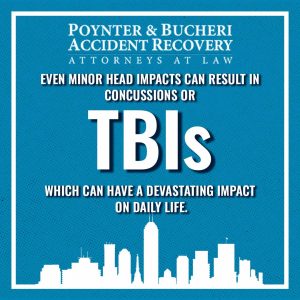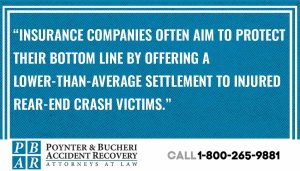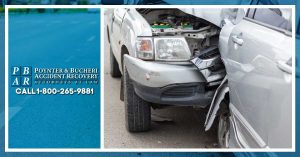Rear-end accidents are among the most common car accidents on Indiana roads. If you’ve been rear-ended, you may be dealing with serious injuries, medical bills, and lost wages. Navigating insurance claims and understanding personal injury law can be overwhelming.
That’s where a dedicated rear-end collision attorney from Poynter & Bucheri can help. Poynter & Bucheri is committed to fighting for your rights and helping secure compensation after such an accident.
Don’t face the traumatic experience of a rear-end collision alone—contact us today at 1-800-265-9881 for a free consultation.
Understanding Rear-End Collisions
A rear-end collision occurs when one vehicle (or several) crashes into the back of another vehicle. These accidents often happen suddenly, leaving little time for the lead driver to react.
Rear-end crashes can result in significant property damage and physical harm, even at low speeds.
If you’ve been involved in a rear-end accident, our experienced attorneys are here to guide you through your legal options. Call 1-800-265-9881 for a no-obligation case evaluation.
Causes of Rear-End Accidents
Crashes can happen for several reasons, but there are a few key elements that can increase your chance of being in a rear-end accident, including:
- Distracted driving: When the following driver is texting, eating, or otherwise not paying attention.
- Speeding: Excessive speed reduces reaction time to avoid hitting the car ahead.
- Sudden stops: The driver stops abruptly at a red light or stop sign without giving the other car (or cars) time to safely stop.
- Poor weather conditions: Rain, snow, ice or other complex weather conditions can make it difficult to stop in time.
- Tailgating: Following too closely leaves insufficient space to react.
- When a car lurches forward: A vehicle may unexpectedly lurch forward due to mechanical issues, driver error, or sudden acceleration, causing a rear-end collision with the person in front.
Understanding the cause of your accident is crucial. Let us investigate the details to build a strong case.
Determining Fault in a Rear-End Accident
In most rear-end collisions, the driver who hits from behind is considered at fault.
However, other complex factors can influence fault determination, such as:
- Lead driver’s actions: If the lead driver reverses suddenly or has malfunctioning brake lights.
- Multiple vehicle collisions: Chain reactions can complicate fault assignment.
- Mitigating circumstances: Unexpected obstacles or sudden medical emergencies.
Each Poynter & Bucheri car accident attorney will collect evidence to establish fault and hold the negligent driver accountable.
Call 1-800-265-9881 to speak with our compassionate and knowledgeable legal team who understands what you need after a rear-end car accident.
Common Rear-End Collision Injuries

Injuries sustained in car accidents can vary widely and common injuries include:
- Whiplash and neck injuries: Sudden jerking of the neck can cause long-term pain, inflammation, and mobility issues.
- Back and spinal damage: Damage to the spine, if left unchanged, may lead to chronic issues including decreased mobility and excruciating pain.
- Traumatic Brain Injuries (TBIs): Even minor head impacts can result in concussions or TBIs which can have a devastating impact on daily life.
- Broken bones and soft tissue injuries: Impact with the steering wheel or dashboard can cause fractures.
Your health is our top priority—seek medical attention immediately after a collision and then call us at 1-800-265-9881 to protect your rights.
Possible Compensation for Car Accidents
Victims of rear-end accidents may be entitled to compensation for:
- Medical expenses: Hospital and other medical bills, rehabilitation costs, and ongoing treatment.
- Lost wages: Income lost due to time off work from injuries sustained.
- Property damage: Repair or replacement of your vehicle and personal belongings.
- Pain and suffering: Awarded for physical pain and emotional distress.
Call our team at 1-800-265-9881 to discuss your rear-end car accident case—you deserve a personal injury attorney who knows how to fight for what you deserve.
The Role of an Insurance Company After You’ve Been Rear-Ended

After a rear-end crash, dealing with insurance companies can be challenging. They may offer an initial settlement that doesn’t cover all your expenses or attempt to deny your claim altogether.
Insurance companies often aim to protect their bottom line by offering a lower-than-average settlement to injured rear-end crash victims.
Don’t let the insurance company undervalue your claim- Contact Poynter & Bucheri at 1-800-265-9881 and choose a rear-end collision attorney who puts your needs first.
What to Do After a Rear Impact Accident
Taking the right steps after an accident can protect your rights:
Seek medical attention: Even if your injury seems minor, get evaluated by a medical professional. Injuries from rear-end collisions, like neck injuries, may not be immediately apparent. Delaying medical treatment can worsen your condition and affect your personal injury claim.
Prompt medical attention is crucial—see that your minor and severe injuries are documented for your case.
Call the police: A police report documents the accident scene and the parties involved.
Exchange information: Obtain the other driver’s insurance information and license plate number.
Document the scene: Take photos of the vehicles, damages, and any people who appeared to be injured.
Avoid admitting fault: Don’t discuss fault with the other driver or insurance company without legal counsel.
Need guidance after a collision? Contact 1-800-265-9881 to schedule a free case evaluation and support every step of the way.
How an Experienced Attorney Can Help You After a Car Accident
An experienced rear-end accident lawyer can:
- Evaluate your case: Determine the value of your claim based on injuries suffered and other factors.
- Gather evidence: Collect medical records, witness statements, and accident reports.
- Negotiate with insurance companies: Advocate for a fair settlement offer.
- Represent you in court: If necessary, take legal action to recover damages.
Our experienced attorneys are ready to fight for your rights—If you’ve been rear-ended due to someone else’s negligence, call us at 1-800-265-9881 to schedule a free consultation.
What If the Accident Is Partially My Fault?

Indiana is a fault state instead of a no-fault state, meaning the at-fault party is responsible for damages. You can recover compensation even if you are partially at fault, but your award may be reduced.
Rear-end car accidents can result in traumatic injuries that have long-term effects on your life. From neck injury to broken bones to TBIs, these conditions may require expensive medical intervention and rehabilitation. It’s important to speak with an attorney right away, even if you think the accident might have been your fault.
Also, be sure NOT to admit fault because rear-end collision rules can be complicated. Anything you say might be used by the at-fault driver to deny your claim.
Unsure about your eligibility for damages after a car accident? Call us at 1-800-265-9881 to evaluate your case and explain your options.
Why Choose Poynter & Bucheri Rear-End Collision Attorney

At Poynter & Bucheri, we work on a contingency fee basis. There are no upfront fees—our priority is securing justice for you without adding financial stress. This means you owe your accident lawyer nothing unless we recover compensation for you.
Our law firm is dedicated to providing personalized legal representation. With extensive experience in rear-end collisions, we understand the challenges you face and are committed to achieving the best possible outcome.
If you or a loved one has been injured in a collision, don’t delay seeking legal help. Time is critical in gathering evidence and filing a claim. Our team is ready to assist you in recovering the compensation you deserve.
Contact Poynter & Bucheri at 1-800-265-9881 for a free consultation with a rear-end accident lawyer.
